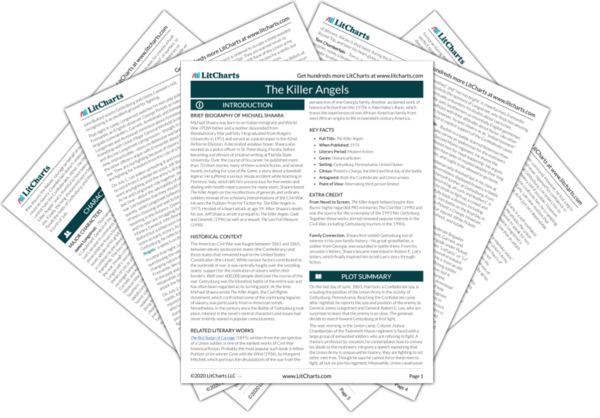Rainstorms frame the action in The Killer Angels. Throughout most of the novel, the threat of rain and storm symbolizes impending violence and disaster; yet, by the end of the book, the long-anticipated eruption of a full-fledged storm symbolizes cleansing, healing, and promise. When Harrison first locates the position of the Union army at the beginning of the novel, he sees the soldiers emerging “out of a blue rainstorm in the east,” and he rides nervously through a lightning storm as he seeks the safety of the Confederate lines. This association of rain with tension is maintained when, on the first day of battle, a young Union soldier fires the battle’s first shots at Confederate skirmishers approaching in the rain. On the eve of the second day of battle, Longstreet, knowing Lee will not be dissuaded from making an unwise attack, “[smells] disaster like distant rain.” At dawn on the third and final day of battle—hours before the disastrous climax of Pickett’s Charge—Longstreet smells rain once again. Following Pickett’s Charge, lightning begins blazing in the distance, the wind carries the smell of rain, and Lee and Longstreet make plans to withdraw under cover of the weather.
Now that the anticipated disaster has occurred (from the Confederate perspective, at least) the symbolism shifts. As Chamberlain sits on Cemetery Hill, overlooking the carnage, the rain begins to fall, washing the day’s dirt from his face; he is only able to stare at the fallen bodies illuminated by lightning. As the rain begins to pour in earnest, he feels pity for the fallen Confederates and gratitude for having experienced such a historic turning-point. A fierce storm floods Gettysburg all night, “washing … the white bones of the dead, cleansing the earth … driving the blood deep into the earth, to grow it again with the roots toward Heaven.” Even though the rain washes away the signs of suffering, it won’t efface the memory of what has happened in Gettysburg; implicitly, the blood spilled will not be wasted, but will “take root” by yielding not only military victory for the present, but greater freedoms in the future.








